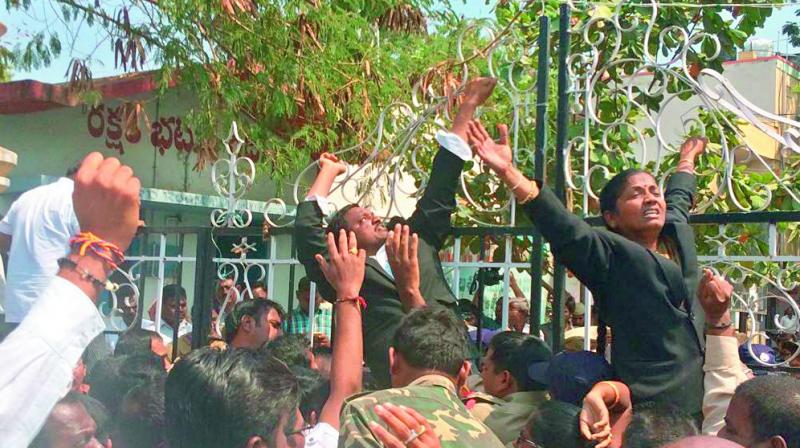Hyderabad: Seema stir for HC set to cause poll trouble

Hyderabad: The agitation of the advocates of Rayalaseema region for constitution of a separate High Court for Andhra Pradesh in Rayalaseema may emerge as a core and contentious political issue in the 2019 elections in AP.
The gaining momentum of the agitation of the Seema advocates is causing lawyers in Telangana some worry as it would further delay the bifurcation of the High Court between TS and Andhra Pradesh.
The judges of the Hyderabad High Court have indicated that the buildings identified by the AP government at Vijayawada to house the new court, are not suitable, and they will wait till October 2018 when the city courts complex in Justice City is ready as promised by the state government. But if that is delayed for any reason, the separation will take place only after the elections in 2019.
Advocates from the Rayalaseema region have been agitating for the past 36 days, demanding a High Court be set up in their region, more particularly in Kurnool, which was the capital when AP was carved out of Madras Province in 1953 under the Sribagh Pact of 1936, and the High Court functioned from Guntur until 1956.
The AP unit of the BJP has also passed a resolution at its Rayalaseema regional meeting, demanding that a second state capital and High Court be set up in the region. The TD had indicated that it might consider setting up a High Court bench in Kurnool.
J. Narayana Swamy, a practising advocate of Ananthapur who had moved a PIL before the Hyderabad High Court seeking to direct the state and Central governments to set up the High Court of AP at Kurnool, said that the AP government has not taken into consideration the Sribagh Pact, 1936, while establishing its headquarters at Velagapudi in coastal Andhra Region and in view of that, the Rayalaseema region is entitled to establish the AP High Court in Kurnool, as it is the old state capital of Andhra State.
He said that a circuit bench of the High Court at Aurangabad was constituted based on the Nagpur Pact of 1953 during the formation of Maharashtra, and various administrative institutions were also decentralised as per the 1953 pact which enabled the overall development of Maharashtra.
He said the Sribagh Pact also called for the decentralisation of the administration, but the ruling government did not consider this in 1956 when the state capital and High Court were shifted to Hyderabad.
In fact, the Rayalaseema lawyers argue that ignoring the spirit of the Sribagh Agreement, which advocated decentralisation of administration in 1956, has led to the partition of AP and will lead to further partition of AP. Nagalakshmi Devi, co-convener of the Rayalaseema High Court Sadhana Samithi and president of the Kurnool Bar Association, said that lawyers have boycotted courts in the region for the past 36 days and will intensify their agitation in the coming days.
She said, “As of now we are building pressure on the ministers and MLAs of the region to convince the government to establish the High Court in the region as this has been neglected since 1956.”
She demanded that the YSR Congress, which is the main opposition party in the state, has to declare its stand with regard to constituting the HC in Rayalaseema.
She said that it was unfortunate that the TD president has gone back on his promise made at the time of the 2014 elections that the High Court will be set up at Kurnool.
Kurnool has advantage over cyclone-prone Vijayawada
Lawyers who are demanding that a High Court be set up in the Rayalaseema region of Andhra Pradesh, say Kurnool has the advantage of being well-connected and situated close to the border.
J. Narayana Swamy, the lawyer who moved a PIL for the purpose, said that land acquisition would not be a problem as there is a lot of government land available in and around Kurnool.
Moreover, coastal Andhra Pradesh region where the state wants to set up the HC at Vijayawada is prone to cyclonic storms - there have been 55 storms between November 1977 and December 2010 - and is thus not suitable for establishment of a High Court or a state capital, he said.
The larger issue of separating the current High Court is leading to several problems.
T. Sri Ranga Rao, leader of the Telangana Advocates Joint Action Committee says that the delay means that the pendency of cases is increasing even in the subordinate judiciary and causing vacancies in large number of posts of judges in the lower courts and High Court as well.

